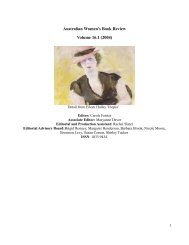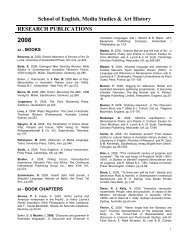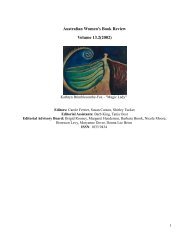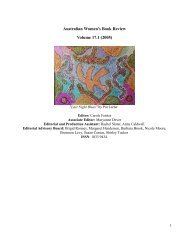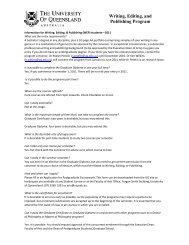Australian Women's Book Review Volume 14.1 - School of English ...
Australian Women's Book Review Volume 14.1 - School of English ...
Australian Women's Book Review Volume 14.1 - School of English ...
Create successful ePaper yourself
Turn your PDF publications into a flip-book with our unique Google optimized e-Paper software.
method subsequently adopted by Brecht. The three main characters, on the other hand, are not only<br />
given personal names that have a signifying dimension, but also have personal histories and hence, the<br />
depth, <strong>of</strong> human beings rather than being mere instruments <strong>of</strong> social control. Due to the duality <strong>of</strong><br />
dramaturgical devices and to memory flashbacks, as well as the meta-theatrical devices and the<br />
intrusions <strong>of</strong> public figures into protagonists' private lives, the sense <strong>of</strong> discontinuity and<br />
representational instability characteristic <strong>of</strong> the avant-garde lingers on, but the individual scenes are<br />
much longer than during Hewett's infatuation with Kinostil in the 1970s. The playwright has moved<br />
closer to the modernist aesthetic described by Murphy that 'updates realism's technical virtuosity', while<br />
still seeking to deconstruct dominant social discourses and, with them, the implicit epistemology,<br />
reality-principle and social value system.<br />
The events and emotions that make up Nowhere's protagonists are built <strong>of</strong> a picturesque series <strong>of</strong><br />
encounters, with Josh as a central figure 'wandering amongst reflections <strong>of</strong> his own persona on the path<br />
towards redemption' and rebirth. The pivotal signifier in the play, its setting, can be largely construed<br />
according to spatial considerations and the symbolic meaning <strong>of</strong> the showground. Its location on the<br />
edge <strong>of</strong> the country town suggests a symbolic reference to Australia and its geographical position on<br />
the map <strong>of</strong> the world. It is the promised country, Alice's Wonderland/Wormland; it is also the 'nowhere'<br />
in which initial settlers ended up - the 'place to disappear' to and live a peaceful life at long last, says<br />
Hewett the poet. When Snow arrived to the showground on the edge <strong>of</strong> Dry Torrent, Josh was its only<br />
occupant. From that it can be inferred that he ended up nowhere. Vonnie repeats several times in the<br />
play that she is going nowhere, and two <strong>of</strong> her songs or, rather, two parts <strong>of</strong> the same song delivered at<br />
the beginning and towards the end <strong>of</strong> the play, first as a solo and then in a duet with Snow, bear the title<br />
'Going Nowhere.' Consequently, when the couple decides to leave the showground, they again choose<br />
Nowhere as their destination. But when finally Snow turns the signpost pointing towards Nowhere in<br />
the opposite direction, all expectations <strong>of</strong> a definite solution in the play are dispersed. One feeling<br />
remains, though. When first sung, 'Nowhere' eerily resonated <strong>of</strong> death; when continued at the point <strong>of</strong><br />
the couple's departure it bore the promise <strong>of</strong> peace, <strong>of</strong> 'belong[ing] somewhere again'. So, the turning <strong>of</strong><br />
the signpost could signify that the land <strong>of</strong> peace stretches all around us. This is also what Josh's<br />
determination to stay put seems to suggest. For he both refuses social integration and stands his ground<br />
to the very end. 'I'm not disappearin', he says. The 'coming down' <strong>of</strong> rain that he alone can anticipate,<br />
the rain which is 'goin' to be a real bobby-dazzler' is Hewett's last and most important symbol, her<br />
discourse with Christian heritage and its Holy Scripture - the Bible. For, unlike Noah, Josh climbs on<br />
top <strong>of</strong> the ro<strong>of</strong> <strong>of</strong> his shack, closer to heaven and the universe, to await the Flood and watch from above<br />
the purification and renewal <strong>of</strong> the land that will bring physical and moral ablution as well. The prophet<br />
in him rejoices at seeing once more the torrent that is going 'to sweeten the waters and green the land<br />
again.' The play folds with the s<strong>of</strong>t sound <strong>of</strong> 'The Rite <strong>of</strong> Spring' accompanied by church bells tolling<br />
faintly, 'as if under water.' Thus, what stays after the book is shut is the promise <strong>of</strong> an overarching<br />
revolution <strong>of</strong> social habit, with marginal people figuring as the heroes with whom our hope should rest.<br />
Or is it, rather, a warning?<br />
Refusal <strong>of</strong> a closure corresponds with the polysemous nature <strong>of</strong> Hewett's writings in general and points<br />
once again to what Richard Murphy calls, 'a historical sense <strong>of</strong> the danger which lies in wait for those<br />
who do not practice some form <strong>of</strong> epistemological skepticism with regard to what are, in effect,<br />
discursive fictions.' Brecht's argument brings us even closer to Hewett: 'And when the fallacies are all<br />
worn out? The last one keeping us company/sitting right across from us/is nothingness.' But it is in Carl<br />
Gustav Jung's legacy the most significant link to this chain <strong>of</strong> intertextuality is found: 'In an era which<br />
has concentrated exclusively upon extension <strong>of</strong> living space and increase <strong>of</strong> rational knowledge at all<br />
41



